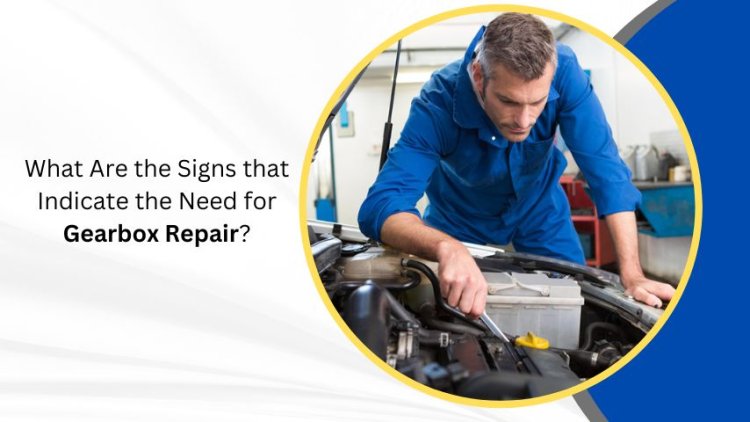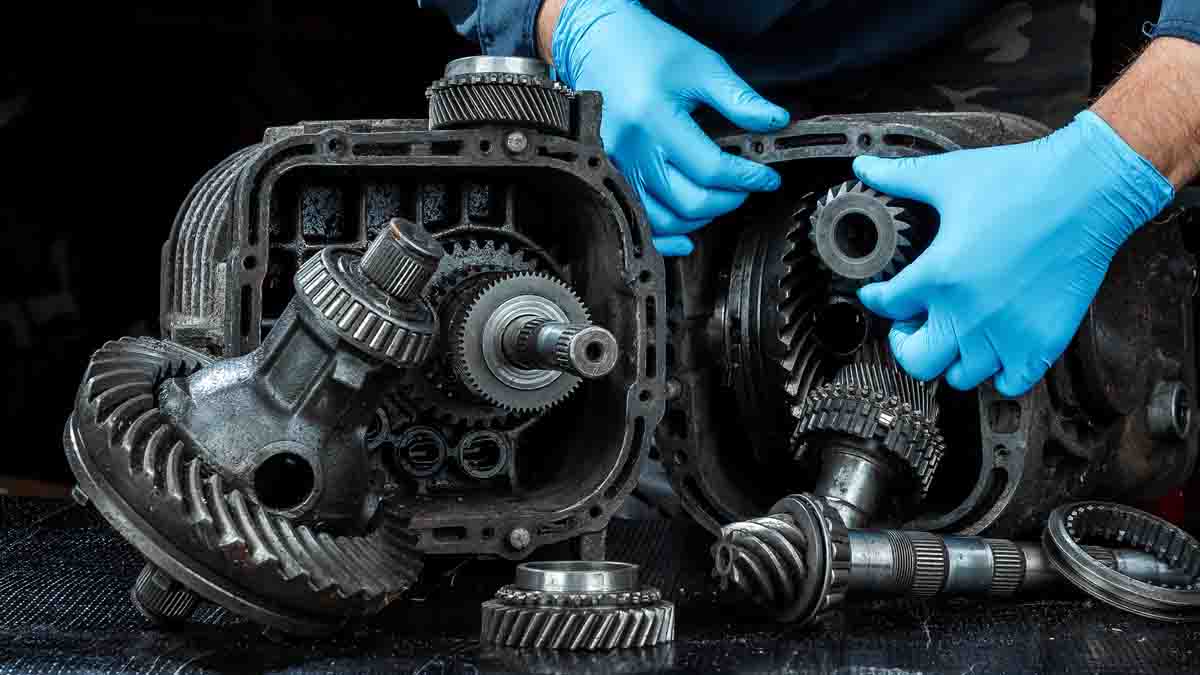What Are the Signs that Indicate the Need for Gearbox Repair?
Share this Post to earn Money ( Upto ₹100 per 1000 Views )

The gearbox is a crucial component of your vehicle's transmission system, responsible for ensuring that the power generated by the engine is effectively transferred to the wheels. Over time, the gearbox can develop problems that, if left unaddressed, can lead to significant issues and costly repairs. Recognizing the signs that indicate the need for gearbox repair early on can save you from a lot of trouble and expense. In this blog, we will discuss the key signs that suggest your gearbox may need repair, helping you maintain your vehicle in optimal condition.
NOTE: Experiencing issues with your gearbox? For professional and reliable gearbox repair visit our website today to find top-rated repair shops and get your gearbox back in perfect working order!
Understanding the Gearbox
What is a Gearbox?
The gearbox, also known as the transmission, is a vital part of a vehicle that controls the application of power. It converts the engine’s speed into torque (force) to move the vehicle.
- Manual Gearbox: Requires the driver to manually shift gears using a clutch and gear stick.
- Automatic Gearbox: Automatically changes gears based on speed and acceleration without driver intervention.

Importance of a Healthy Gearbox
A well-functioning gearbox ensures smooth shifting, efficient power distribution, and overall vehicle performance. Neglecting gearbox maintenance can lead to severe issues, affecting the safety and reliability of your vehicle.
Common Signs of Gearbox Problems
Unusual Noises
One of the first signs that your gearbox may need repair is the presence of unusual noises. These noises can vary depending on the type of transmission.
- Grinding Noise: Often indicates a problem with the gears. In manual transmissions, this can be due to worn-out gears or a failing clutch.
- Whining Noise: Common in automatic transmissions and can be caused by issues with the fluid or internal components.
Difficulty Shifting Gears
If you experience difficulty when shifting gears, it’s a clear sign that something is wrong with your gearbox.
- Hard Shifts: Struggling to shift gears or the need to force the gear stick can indicate issues with the transmission fluid or internal components.
- Slipping Gears: This occurs when the transmission slips in and out of gear without any input from the driver, which can be dangerous and indicates a serious problem.
Delayed Response
A delayed response when shifting from one gear to another, especially in automatic transmissions, is a sign that your gearbox may need attention.
- Delayed Engagement: When there’s a delay before the car starts to move after shifting gears.
- Lag in Acceleration: Noticeable lag when accelerating, often due to transmission problems.
Fluid Leaks
Transmission fluid is crucial for the smooth operation of your gearbox. If you notice fluid leaks under your vehicle, it’s important to address them promptly.
- Red or Brown Fluid: Transmission fluid is typically red or brown. Puddles of such fluid under your vehicle indicate a leak.
- Burnt Smell: A burnt smell from the fluid suggests overheating and potential damage to the gearbox.
Warning Lights
Modern vehicles are equipped with dashboard warning lights that indicate various issues, including transmission problems.
- Check Engine Light: This light can indicate a wide range of issues, including problems with the gearbox.
- Transmission Warning Light: Some vehicles have a specific warning light for transmission issues, alerting you to potential problems.
Strange Vibrations
Unusual vibrations or shaking, especially when shifting gears, can indicate a problem with your gearbox.
- Vibrating Gear Stick: Excessive vibrations in the gear stick while driving.
- Shuddering: Shuddering or shaking of the entire vehicle when shifting gears or accelerating.
Poor Performance
A malfunctioning gearbox can lead to poor vehicle performance, affecting acceleration, fuel efficiency, and overall drivability.
- Reduced Acceleration: Struggling to accelerate, especially when climbing hills or carrying heavy loads.
- Increased Fuel Consumption: A noticeable drop in fuel efficiency, often due to the gearbox working harder to maintain performance.
Causes of Gearbox Problems
Lack of Maintenance
Regular maintenance is crucial for the health of your gearbox. Neglecting routine checks and fluid changes can lead to significant issues.
- Old Transmission Fluid: Over time, transmission fluid can degrade and lose its effectiveness, leading to poor lubrication and cooling.
- Worn Components: Regular wear and tear without proper maintenance can lead to damaged gears and other components.
Driving Habits
Your driving habits can also impact the health of your gearbox.
- Aggressive Driving: Rapid acceleration, hard braking, and aggressive driving can put extra strain on the gearbox.
- Towing Heavy Loads: Frequently towing heavy loads can cause excessive wear on the transmission.
Manufacturing Defects
In some cases, gearbox problems can arise due to manufacturing defects or issues with specific vehicle models.
- Design Flaws: Certain models may have design flaws that make the gearbox more prone to issues.
- Recall Notices: Always check for recall notices related to your vehicle’s transmission system.
Preventive Measures
Regular Maintenance
Regular maintenance is key to preventing gearbox problems and ensuring long-term performance.
- Fluid Checks and Changes: Regularly check and change transmission fluid according to the manufacturer’s recommendations.
- Professional Inspections: Have your gearbox inspected by a professional mechanic during routine maintenance.
Smooth Driving
Adopting smooth driving habits can reduce the strain on your gearbox and prolong its life.
- Gentle Acceleration and Braking: Avoid rapid acceleration and hard braking to reduce wear on the transmission.
- Avoid Overloading: Don’t overload your vehicle or tow more than it’s rated for.
Address Issues Promptly
Addressing minor issues promptly can prevent them from becoming major problems.
- Listen for Noises: Pay attention to any unusual noises and have them checked out immediately.
- Monitor Performance: Keep an eye on your vehicle’s performance and address any changes promptly.
Conclusion
Recognizing the signs that indicate the need for gearbox repair can save you time, money, and stress. Unusual noises, difficulty shifting gears, delayed response, fluid leaks, warning lights, strange vibrations, and poor performance are all indicators that your gearbox may need attention. Regular maintenance, adopting smooth driving habits, and addressing issues promptly are key to keeping your gearbox in good condition. If you experience any of these signs, consider seeking professional gearbox repair to ensure your vehicle remains safe and reliable.
For more insightful articles related to this topic, feel free to visit blog.rackons.

 arthor
arthor 















